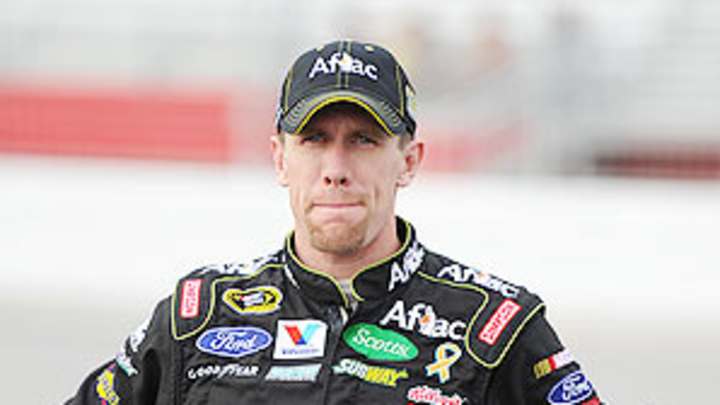Jimmie Johnson era has stolen prime years from several drivers


That Jimmie Johnson. He's enough to make a guy envious.
There was that Jimmie Johnson, walking with President Obama last week for a ceremony at the White House as the rest of the attending Sprint Cup drivers waited for them. And there was that Jimmie Johnson again, presenting the president a set of framed driving gloves.
"It gets to all of us, trust us," Kyle Busch said. "We all sit there and we watch Jimmie, Jimmie, Jimmie and we're all like, 'C'mon, man. How much more does this guy need?'
"But, it's good. When you win the championship, that's the recognition you want. The only problem ... is that he's won it five times in a row, so he deserves it."
But such is life in the Jimmie Johnson era, this oppressive, life-during-the-blitz period his counterparts have lived through since his rookie season in 2002 and suffered through since he won the first of five consecutive Sprint Cup championships in 2006. Drivers of his approximate age -- 36 on Saturday -- have watched years of their prime evaporate into his cloud of tire smoke at the season finale at Homestead-Miami. Even in a sport where drivers can compete at a high level deep into their 40s, those salad years are precious.
"Line up the strengths of the No. 48 team," said three-time Sprint Cup champion and television analyst Darrell Waltrip. "They don't have very many weaknesses. Line up the strengths of everyone they're competing against, and on every one of those other teams you can find things they are lacking that keeps them from being able to knock the guy [Johnson] off the top of the heap."
For a driver like Carl Edward, 32, who entered the series three years after Johnson and has finished among the top five in points three times (runner-up in 2008), Johnson is consuming his glory days. He knew this as early as 2007, ruing, after Johnson repeated as champion, how much work he would have ahead. Johnson fended off Edwards in 2008, and in 2009, Edwards couldn't muster the expected challenge for the throne again. While contenders never seem to muster multiyear assaults, Johnson just keeps advancing his legend, confounding his competitors and their frustrated fans.
"I continue to be impressed with how this team functions at such a high level year after year," Waltrip said. "I ask fans, 'Why are you mad at Jimmie Johnson? You should be upset with whoever your favorite driver is.'"
Four of five teams, Waltrip said, "have the same access to resources as that No. 48 team has, so I don't know why anyone would want to be mad at Jimmie. Fans should ask their driver, 'Why can't you compete at the level? Why can't you be as good as he is? Why can't you get your car to run like his car does?'"
For Jeff Gordon, whose leap of faith and commitment to financial resources helped launch Johnson as a driver and he as an equity partner at Hendrick Motorsports a decade ago, his protégé has been a boon and a nuisance. Friends, but with a competitive edge to their relationship, Gordon and Johnson have tussled for the prime real estate and title contender needs on the track.
Gordon appeared to be closing in on a fifth title in 2007, leading the standings by 68 points after winning at Concord, N.C., with five races remaining. But Johnson won four of the last five races of the season to become the sport's first repeat champion since Gordon in 1997-98.
Waltrip considers the 40-year-old Gordon the favorite to unseat Johnson in what would be a fascinating bit of symmetry.
"He's such a smart driver, and he finishes every race," he said of Gordon, a three-race winner in the regular season. "You can win the championship without having to win in the Chase. If these other guys fool around with the rivalries between different guys upset here and mad there, Jeff Gordon will slip right in there and get himself a fifth championship.
"He has got to stay aggressive, though. You get a little older and you get a little cautious and some of those late melees we have these days, these late restarts, you've got to be aggressive. You have to take. You can't give. If he can survive some of those situations and come out on top a few times, he's the guy to beat, I think."
But that has been said so many times about so many drivers since 2006.
Four races before his last-lap broadside battle with Johnson at Pocono rekindled a smoldering acrimony between himself and Johnson, Kurt Busch -- who held off Johnson by eight points to win the 2004 title -- was philosophical about how his rival had come to dominate the sport and color how contemporary drivers will be judged.
"I'm part of it," he said. "Decades from now you're going to see [different] champions' names all across the board and [Johnson's name in] a block from 2006-'10 and hopefully it doesn't go until '11. And it's going to be like, 'Wow, look at that. That guy won five years straight. Who were all those other guys who couldn't knock him off?' Or 'Wow, he was that good, because [two-time champion Tony] Stewart was in that mix, [Jeff] Gordon was in that mix.'
"All of us are a part of his dynasty, and it's always going to be there, whether it's good or if it's bad. It's like growing in this era with Dale Jr., the king of marketing and licensing. He's blocked everybody else out."
